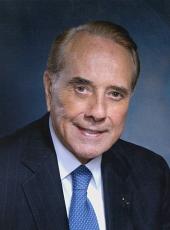Dole/Kemp Press Secretary Nelson Warfield released the following statement today:
"Bill Clinton followed his typical rally recipe today: begin with a known Dole policy, water it down with liberal rhetoric, re-heat, and serve as your own initiative,
"On May 28, in Aurora, Colorado, Bob Dole said as President, he 'will propose legislation requiring drug testing at every stage of the federal criminal justice system, with appropriate sanctions for those who fail these tests.' Bill Clinton's remarks today were simply a shameless attempt to cover his failed liberal drug policy."
-- Nelson Warfield
Press Secretary
Under Bill Clinton's Laissez-Fair Drug Policy:
The DEA has lost over 200 agents since Clinton was elected. In addition, no DEA special agents were trained in 1993 and none were budgeted to be trained in either 1994 or 1995. ("Losing Ground Against Drugs," Senate Judiciary Committee, December 19, 1995,, Investigator's Business Daily, June 19, 1995) a Federal Drug prosecutions dropped 12% in the first two years of the Clinton Administration, ("Losing Ground Against Drugs," Senate Judiciary Committee, December 19 1995)
As a candidate for President in 1992, Bill Clinton claimed he would put a premium on drug interdiction. As President, however, Clinton has orchestrated a strong shift away from interdiction efforts. His request for FY96 represented a 37% cut from the 1991 levels. (National Drug Control Strategy, February 1995)
While the rest of the Clinton Administration ignored the war against drugs, Surgeon General Joycelyn Elden called for the serious consideration of drug legalization. (Dayton Daily News, November 27, 1994)
One of Bill Clinton's first acts in office was to cut his drug policy staff 83% from 146 to 25. (Los Angeles Times, February 26, 1996)
In Bill Clinton's first year in office, the National Security (council "dropped the drug war from one of three top priorities to No. 29 on a list of 29, according to several sources." (Star Tribune, February 14, 1993)
President Clinton.Surrender in the Fight Against Drugs
September 11, 1996
Protecting our Children?
Under Bill Clinton's administration (from 1992 to 1995):
Overall use of all drugs among 12- to 17-year-olds has skyrocketed 105%.
Fully one in ten children between the ages of 12 to 17 use drugs monthly.
Marijuana use among young people has more than doubled, up 141%. From 1994 to 1995 alone, marijuana use has jumped 37%.
Use of LSD and other hallucinogens has nearly tripled (an increase of 1830/o) among young people,
From 1994 to 1995 alone, hallucinogen use has shot up by 54%,
Monthly cocaine use among teenagers is up 166% between 1994 and 1995. (Preliminary Estimates from the 1995 National Household Survey, on Drug Abuse; U.S. Dept. of HHS; 08196.)
Largest Anti Drug Budget Ever?
Among is first acts as president was cutting the 'Drug Czar's office of 83%
Clinton's FY96 interdiction budget represented a 37% cut from1991 levels
Clinton has cut 227 Drug Enforcement agents since 1992. (National Drug Control Strategy, February 1995; Heritage Foundation Reports, 7/12/96).
Providing Proven Leadership?
When asked by a group of young people on MTV if he would use marijuana again if he had the chance to do it over, Clinton laughed and said "sure, if i could. I tried before" (MTV, 0/16/92)
The President's own FBI chief complained bout "the lack of 'any true leadership' insteeming the influx of herion and cocaine." (newsweek, 8/28/96)
Bill Clinton's spokesman minimized the dangers of using drugs from the White House podium, and his own Surgeon General suggested legalizing them.
Just Say Nothing: In 1993 and 1994, President Clinton made seven addresses, and interviews, none mentioned illegal drugs. The President's 1993 and '94 presidential papers reveal 24 references to illegal drugs in a total of 3,370 presidential statement, addresses and interviews. ("A Review of the Status of the Drug War", House Comm. on Govt Reform and Oversight; 3/19/96)
Strengthening Our Border?
Bill Clinton's initial '94 budget request would have eliminated 93 border patrol slots. (Congressional Quarterly; 07/31/93.
His 1995 budget request proposed to eliminate 621 drug enforcement positions from the Drug Enforcement Administration (DEA), Immigration and Naturalization Service (INS), Customs Service, FBI and the coast Guard (John P. Walters, President, New Citizenship project; Heritage Foundation Reports; 7/12/96)
Establishing Tougher Penalties?
Federal drug prosecutions dropped 15% in the first two years of the Clinton Administration.
Then Drug Policy Director Lee Brown called "the policies of the new U.S. Attorneys who demphasized prosecution of small-scale drug offenders," which account for the decline, "consistent with DOJ policy." (Losing Ground Against Drugs," Senate Judiciary Committee, 12/19/95; Heritage Foundation Reports; 7/2/96.
Robert Dole, Dole Campaign Press Release - Dole Campaign Statement on Bill Clinton and Drugs Online by Gerhard Peters and John T. Woolley, The American Presidency Project https://www.presidency.ucsb.edu/node/316748

